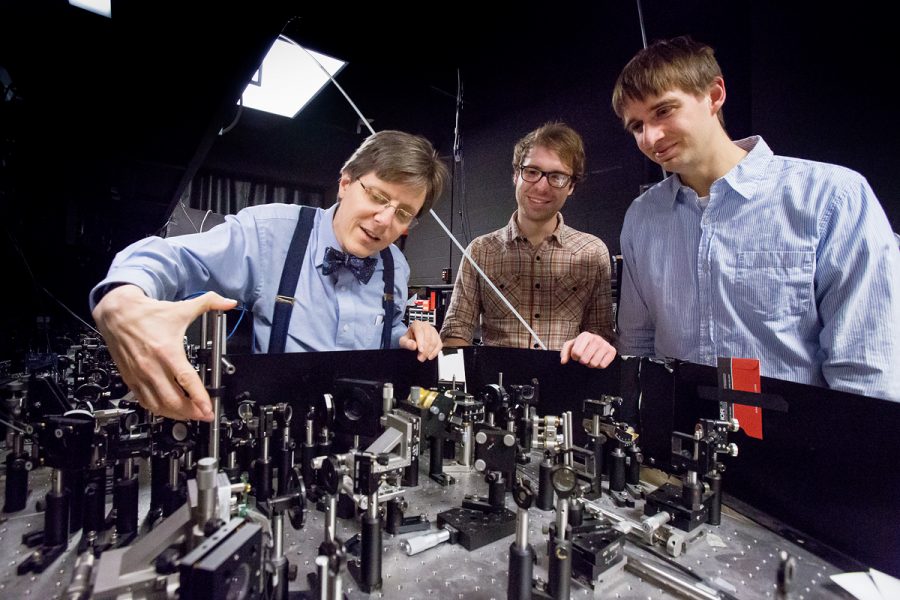Illinois invests into quantum computing
Physics Professor Paul Kwiat (left) working with graduate students in the lab at Loomis Laboratory of Physics. Kwiat is working on improving quantum computing.
November 8, 2018
Paul Kwiat, professor in Engineering, pulled two quarters from his wallet and spun them on the table. He called the spinning coins his own personal quantum computer.
The University is investing $15 million into the Illinois Quantum Information Science and Technology Center, which will allow individual professors from across campus to converge and further research quantum computers and other areas of quantum information science.
Kwiat uses the analogy of spinning counts to explain the infinite number of tasks quantum computers are capable of completing.
“If you have a coin it can be heads or tails. But you can imagine a spinning coin which is somehow heads and tails at the same time,” Kwiat said.
Brian DeMarco, professor and associate head for undergraduate programs, said IQUIST will focus on the development of not only quantum computers, but also communication, measurement and sensing.
Get The Daily Illini in your inbox!
“That’s what quantum information science is about, is finding ways to build that quantum computer and also researching very fundamental questions about what we can do,” DeMarco said.
Some of what quantum information science research can do is already being used today, Kwiat said. For example, quantum cryptography is a secure messaging system readily available to companies with deep pockets today.
IQUIST will focus primarily on the development of a quantum computer, which DeMarco said will allow researchers to optimize certain problems.
“When are we going to get there? We don’t really know,” DeMarco said. “The reason there’s been all this buzz is because people are starting to feel like we’re close.”
Thanks to the establishment of IQUIST and the growth of quantum information science, the University is working to create a professional masters program for a quantum science and engineering degree, as well as an undergraduate-level applied physics degree with a quantum science and engineering track.
“IQUIST will make more educational opportunities to students, not just research opportunities,” DeMarco said.
Joseph Chapman, doctoral student in physics, said IQUIST will attract the attention of new students and allow them to learn about the field to decide whether or not it is something they want to work in.
“IQUIST will provide more opportunities for upcoming students to get experience in quantum information, leading to better trained scientists and engineers capable of working in this up-and-coming field,” Chapman said.
Kristina Meier, graduate student in physics, said IQUIST will provide more awareness and funding to the importance of progress within the field of quantum information science.
“Having a dedicated institute for quantum information research will encourage top scientists and students to come to the University of Illinois to do research, which will in turn promote progress in the field,” Meier said.
For a full version of the story, see dailyillini.com.







